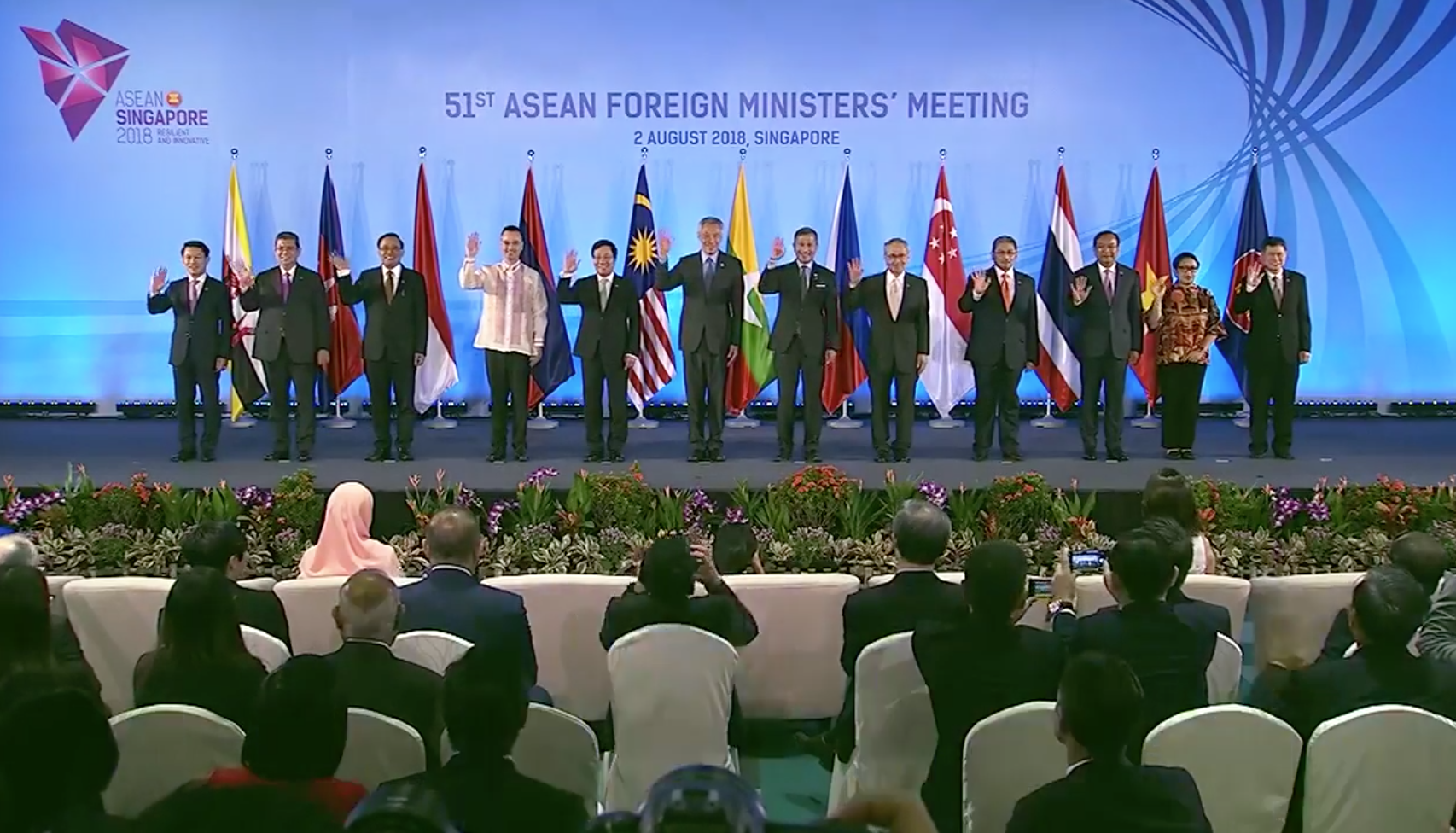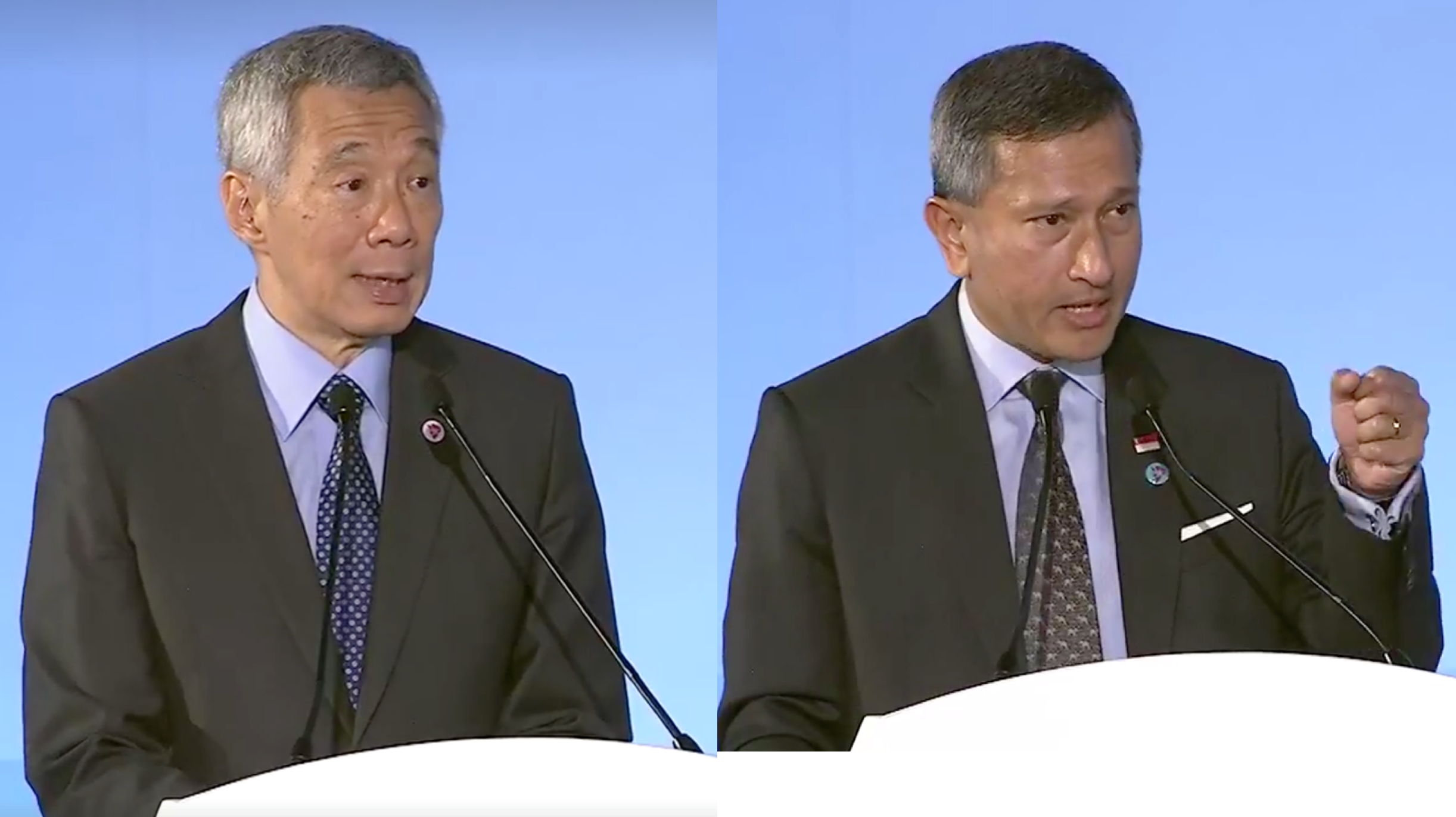As the forces of nationalism and protectionism grow stronger throughout the world, ASEAN has to stay united to remain relevant, said Prime Minister Lee Hsien Loong.
PM Lee was speaking at the opening ceremony of the 51st ASEAN Foreign Ministers meeting held on Thursday, August 2.
 From left to right are Laos' Saleumxay Kommasith, Malaysia's Saifuddin Abdullah, Myanmar's U Kyaw Tin, Philippines' Alan Cayetano, Vietnam's Pham Binh Minh, Singapore's Prime Minister Lee Hsien Loong, Singapore's Vivian Balakrishnan, Thailand's Don Pramudwinai, Brunei's Erywan Yusof, Cambodia's Perak Sokhonn, Indonesia's Retno Marsudi and ASEAN Secretary-General Lim Jock Hoi. (Screenshot via Lee Hsien Loong/FB)
From left to right are Laos' Saleumxay Kommasith, Malaysia's Saifuddin Abdullah, Myanmar's U Kyaw Tin, Philippines' Alan Cayetano, Vietnam's Pham Binh Minh, Singapore's Prime Minister Lee Hsien Loong, Singapore's Vivian Balakrishnan, Thailand's Don Pramudwinai, Brunei's Erywan Yusof, Cambodia's Perak Sokhonn, Indonesia's Retno Marsudi and ASEAN Secretary-General Lim Jock Hoi. (Screenshot via Lee Hsien Loong/FB)
He cited two specific examples where ASEAN is working together with its partners to improve economic integration and connectivity:
- The Regional Comprehensive Economic Partnership (RCEP) between ASEAN and its six FTA partners
- The EU-ASEAN Comprehensive Air Transport Agreement (CATA)
When RCEP is completed, it will be the world's largest trading bloc, encompassing one-third of global GDP. CATA also represents the first substantive aviation arrangement between two major regional groupings.
Said PM Lee:
"When established, these two, the RCEP and the ASEAN-EU CATA will send a clear signal of ASEAN’s commitment to trade liberalisation and economic integration."
PM Lee cautioned that he does not expect negotiations to be easy, and that trade-offs and difficult compromises will have to be made. However, he feels that it will pay off in the long term.
ASEAN at an "inflexion point"
Foreign Minister Vivian Balakrishnan also gave a speech after PM Lee.
He said ASEAN is at an "inflexion point" due to its changing security and economic landscape and it needs to be ready for the future.
Such changes, according to him, include the transitioning into a "multipolar world", the onset of a potential trade war, as well as the ongoing digital revolution.
ASEAN's milestones in the past months
Vivian, who met with Chinese Foreign Minister Wang Yi on Wednesday, August 1, also raised the four milestones ASEAN has achieved in the "last couple of months".
They are:
- Greater cooperation against security challenges including cyber-threats and terrorism
- Improved trade facilitation in the region -- negotiations on RCEP (Regional Comprehensive Economic Partnership) are going well
- Greater connectivity through the ASEAN Smart Cities Network (ASCN)
- Deeper people-to-people connectivity through the arts, music and e-sports
Unity and Centrality
Nevertheless, while ASEAN celebrates its achievements so far, Vivian said it is important for the grouping to "take a reality check and to appreciate the many challenges which lie ahead".
He also highlighted the importance of remaining anchored on the core principles of "ASEAN unity and Centrality" -- he said the former is needed before ASEAN can aspire to the latter.
In addition, he said ASEAN needs to "double down" on its community-building efforts.
But as ASEAN "cannot do this alone", he stressed the need for ASEAN to collaborate with external partners such as other neighbouring countries in the region through ASEAN-led initiatives.
He also cited Singapore's first Foreign Minister S. Rajaratnam who was present at the signing of the grouping's formation in Bangkok 51 years ago: "If we do not hang together, we will all hang separately."
You can watch the opening ceremony here, including the singing of the ASEAN anthem and a dance performance:
ASEAN & China
South China Sea
Vivian also announced "yet another milestone" at the start of an annual ministerial meeting between ASEAN and China -- the foreign ministers have agreed on a single draft Code of Conduct (COC) negotiating text, according to a report by Channel NewsAsia.
The document will be the basis of negotiations on a South China Sea COC -- a set of rules outlining the norms or proper behaviour to take in the maritime region.
Besides being the ASEAN chair this year, Singapore is the country coordinator of ASEAN-China dialogue relations as well.
Previously, both ASEAN and China have adopted a code for unplanned encounters in the South China Sea in 2016, and achieved the operationalisation of an emergency hotline for maritime emergencies in the area in 2017.
Trade relations
Both ASEAN and China have also renewed their commitment to speed up negotiations on RCEP in a bid to improve economic integration.
[related_story]
ASEAN & North Korea
The ASEAN Regional Forum (ARF) taking place this Saturday is also a chance for ASEAN to contribute to better relations between North Korea and the region.
The ARF is the only multilateral group in which North Korea is a member.
North Korea's Foreign Minister Ri Yong-ho will be meeting his counterparts from ASEAN.
South Korea's Foreign Minister Kang Kyung-wha is seeking to meet Ri as well.
If that happens, it will be the first meeting for the foreign ministers of the two Koreas in 11 years.
US Secretary of State Mike Pompeo will also be in town for the East Asia Summit (EAS) to address the region's "most critical security challenges" along with his counterparts from ASEAN, Australia, China, Japan, India, New Zealand, South Korea and Russia.
He has previously reaffirmed US commitment to greater engagement with the Indo-Pacific region.
Top image adapted via Lee Hsien Loong/FB.
Some other stories on ASEAN you might be interested in:
If you like what you read, follow us on Facebook, Instagram, Twitter and Telegram to get the latest updates.
